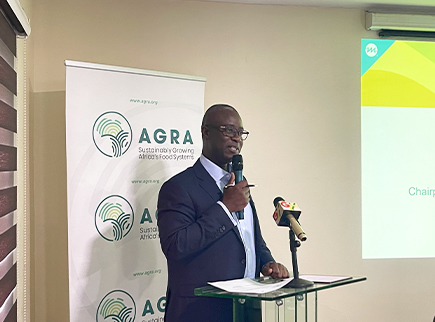Dr Godfred Seidu Jasaw, Chairman of the Parliamentary Select Committee on Food, Agriculture and Cocoa Affairs, has called on Ghanaians to cultivate a culture of resilience to protect the environment. adapt to realities of climate change, and safeguard Ghana’s future.
He said the fight against climate change must go beyond technical interventions to embrace behavioral and institutional transformation at all levels.
Dr Jasaw was speaking at the opening ceremony of a two-day National Validation Workshop which was organised by AGRA in partnership with Mathematica, in Accra.
It was on climate vulnerability mapping and climate change risk analysis for guiding climate adaptation interventions and investments in Ghana, Kenya, Tanzania, Uganda and Zambia.
Dr Jasaw said climate change was no longer a distant phenomenon but a daily challenge with profound implications for Ghana’s agriculture, food security, and rural livelihoods.
He said rising temperatures, erratic rainfall patterns, prolonged droughts, and increased flooding, were already reshaping the country’s agricultural systems and threatening the livelihoods of millions.
He said while Government initiatives such as national climate adaptation plans, irrigation investments, and the promotion of climate-smart agriculture were commendable and more coordinated, innovative and data-driven responses were essential.
Dr Jasaw highlighted the tools under validation: high resolution climate vulnerability maps and risk profiles, as critical instruments for decision-making and policy formulation.
He said innovations in real-time data collection, early warning systems, and knowledge-sharing platforms could help bridge the gap between research and practice, empowering farmers with timely information on crop choices, planting times, and sustainable land management practices.

He, however, cautioned that technology alone was not the solution. Public awareness, behavioral change, and community participation remain equally vital in building a sustainable response to climate threats.
“Technology isn’t enough. It is equally necessary to raise awareness and change behaviors. Climate change is not just an issue for scientists and policymakers but impacts all Ghanaians, from urban consumers to rural farmers” he said.
Dr Jasaw commended the experts and stakeholders present for contributing their knowledge and experience to the validation process, describing it as a crucial step toward developing climate adaptation strategies that were both evidence-based and locally relevant.
“By validating these maps and profiles, we are not only adding to the body of knowledge but taking meaningful action to secure Ghana’s future,” he stressed.
Dr Jeremiah Rogito, a Specialist for Soil Health and Climate, AGRA, said the climate vulnerability and risk mapping assessment was an initiative they have been implementing in collaboration with Mathematica and EDI Global over the past eight to ten months.
He said climate change was devastating communities across the world, and Africa remained one of the most disproportionately affected regions.
“It is therefore essential that we develop effective tools and interventions that can inform evidence-based decisions and guide strategic investments to address the climate crisis both across the continent and here in Ghana”
“By examining the country’s agroecological zones through this mapping process, we can better guide investment decisions, determine the most suitable adaptation tools, and strengthen resilience across regions where farming is most vulnerable to climate risks,” he added.

